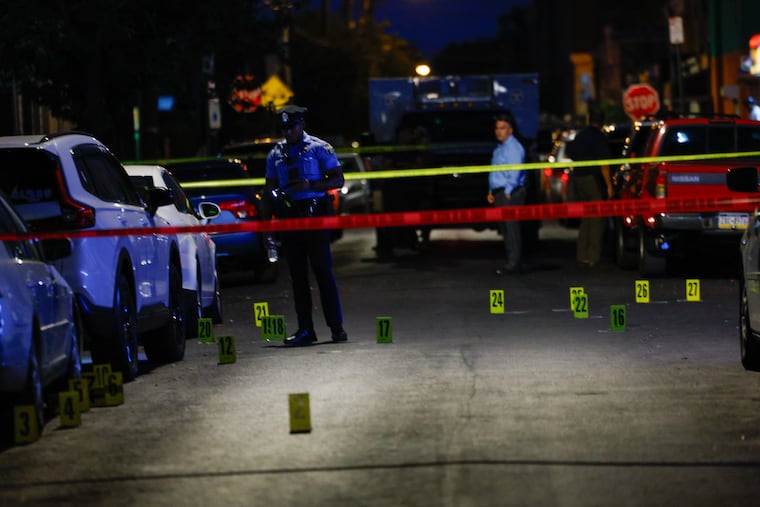Philly has made surprising progress in lowering the murder rate this year. Let’s not throw it all away.
Homicides are down thanks, in part, to gun violence prevention programs. But the funding for many of them runs out at the end of 2024. There must be continued investment and commitment.

I will never get used to the sound of grown men crying for their mothers and asking strangers if they will live.
I whispered to my patient, “You’ll be OK. You’re in great hands,” even though I knew he may not leave the emergency department alive.
Four young Black men — none of them older than 25 — had arrived at our trauma bays. Like a well-oiled machine, doctors and nurses went to work, searching for gunshot injuries.
In 15 minutes, my patient was whisked away for emergency surgery because of the location of his gunshot wounds. Another patient was “lucky” and did not need surgery. Two other men died.
The emergency department soon returned to normal, as if we all did not just witness something that was anything but. As family members trickled in to see their loved ones, the room filled with a distinct scream — the cry of a mother, wife, or sister who just learned that despite all we did to save their loved one, they were gone.
This was the soundtrack of my summer. As we approach the end of the year, I cannot help but think, how many more cries will Philadelphia hear moving forward?
The city’s recent efforts in gun violence prevention measures likely contributed to the astounding drop in homicides and shootings this year, but funding for many of these programs will run out at the end of December. So, what will happen next? The city needs to step up, as we cannot lose progress.
As the pandemic took hold, cities across the country saw a record increase in gun violence. According to a 2021 study by Penn State College of Medicine, gun violence rates nationwide during the COVID-19 pandemic increased by more than 30%; in 2022, 65% of Philadelphians reported hearing gunshots in their neighborhoods in the previous year.
The effects of such widespread violence are cataclysmic. In 2022, it cost Philadelphians more than $376 million to pay for gun victims’ first hospitalizations. That price tag does not include additional health-care needs, mental health treatment, or the potential loss of salary.
Moreover, Black communities bear the brunt of the effects of gun violence, with approximately 69% of gun victims in Philadelphia being Black men. Though gun violence affects all communities, Black Philadelphians bear the most financial burden, psychological trauma, and sociological effects of it.
Because of the unrelenting bloodshed, in 2022, former Mayor Jim Kenney increased the city’s investment in a multipronged strategic plan that targeted gun violence. Although this plan was created in 2019, it was not adequately funded until Kenney acted. Since then, roughly a half-billion dollars has been invested in those efforts.
This strategy was novel because it addressed gun violence as a public health crisis, leading the city to develop innovative gun violence prevention programs that reached across sectors. For example, city officials created Philadelphia’s first firearm homicide review coalition, which examines firearm data and then responds directly to trends with targeted prevention tactics.
Black Philadelphians bear the most financial burden, psychological trauma, and sociological effects of gun violence.
They also created the community crisis intervention program, the first of its kind, where local advocates visit neighborhoods most affected by violence, find potentially violent scenarios, and interrupt them before they escalate.
Then, officials implemented the first hospital violence injury prevention program across the six Philadelphia Level 1 trauma hospitals. This is a program that provides trauma-informed care for patients with a violent injury by creating a bridge between these hospitals and the community.
These are a few innovative examples out of many that the city created and supported to decrease gun violence over these few years.
The city has already begun to reap the benefits of this substantial investment. Compared with 2023, there has been a 40% drop in shootings in Philadelphia — the most significant decrease in gun violence in any major American urban center.
Despite that progress, there is no consensus on how to best continue these efforts beyond 2024. Because there is no legislative bill attached to this plan, there must be annual recommitment by the mayor to allocate funding from local tax dollars. It is crucial for City Hall to remain committed to its previous investment in this strategic plan.
Although the long-term effects of these programs have not been determined, the decrease in gun violence in Philadelphia is a victory that must not be understated. There has been a real commitment to addressing the many contributing factors that lead to gun violence in Philadelphia, including poverty, lack of commonsense gun laws, unsafe neighborhoods, and lack of commitment to job and workplace development. We must not lose sight of this commitment.
Furthermore, we cannot go back to blood-filled summers.
As I think of my patient that day, who ultimately did not survive that emergency surgery, I think again of the mother’s cry that filled the emergency department. We cannot keep mourning our sons and our daughters who are victims of senseless violence.
There must be continued monetary investment and political commitment to multifaceted gun violence prevention measures, for the future of our children and our city.
Ogechi Nwodim is an emergency medicine resident physician who focuses on fighting structural racism through community-based interventions in urban areas.